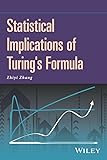Statistical implications of Turing's formula/ Zhiyi Zhang
Publication details: New Jersey: John Wiley, 2017Description: xiv, 282 pages, 23cmISBN:- 9781119237068
- 23 SA.02 Z63
| Item type | Current library | Call number | Status | Date due | Barcode | Item holds | |
|---|---|---|---|---|---|---|---|
| Books | ISI Library, Kolkata | SA.02 Z63 (Browse shelf(Opens below)) | Available | 138448 |
Includes bbliographical references and indexes
Preface,
Turing's formula,
Estimation of Simpson's indices,
Estimation of Shannon's entropy,
Estimation of diversity indices,
Estimation of information,
Domains of attraction on countable alphabets,
Estimation of Tail probability,
References,
Author index,
Subject index
Turing's formula is, perhaps, the only known method for estimating the underlying distributional characteristics beyond the range of observed data without making any parametric or semiparametric assumptions. This book presents a clear introduction to Turing’s formula and its connections to statistics. Topics with relevance to a variety of different fields of study are included such as information theory; statistics; probability; computer science inclusive of artificial intelligence and machine learning; big data; biology; ecology; and genetics. The author provides examinations of many core statistical issues within modern data science from Turing's perspective. A systematic approach to long-standing problems such as entropy and mutual information estimation, diversity index estimation, domains of attraction on general alphabets, and tail probability estimation is presented in light of the most up-to-date understanding of Turing's formula. Featuring numerous exercises and examples throughout, the author provides a summary of the known properties of Turing's formula and explains how and when it works well; discusses the approach derived from Turing's formula in order to estimate a variety of quantities, all of which mainly come from information theory, but are also important for machine learning and for ecological applications; and uses Turing's formula to estimate certain heavy-tailed distributions.
There are no comments on this title.



























